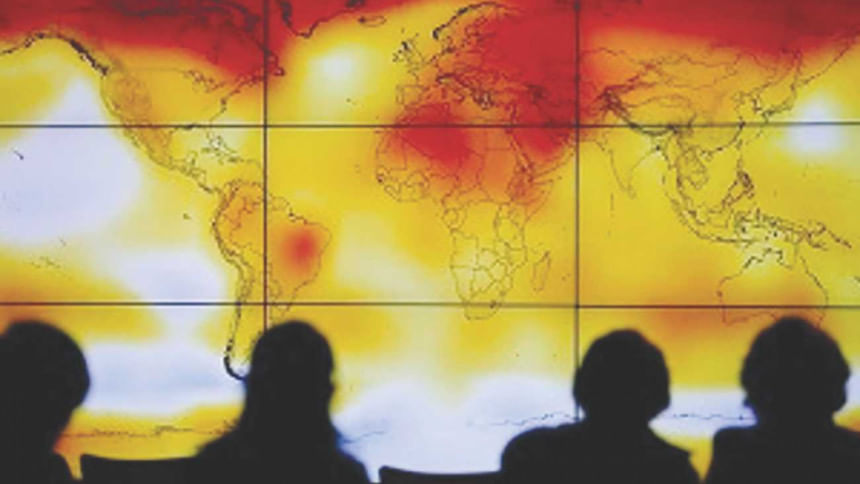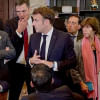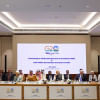G20 summit outcome beyond the cold prints

From the 15-page G20 Leaders' Declaration adopted in Hamburg, Germany, let me glean three aspects of the text to assess their possible impact on a country like Bangladesh.
The leaders stated, under the sub-text titled Climate and Energy Action Plan for Growth: "We take note of the decision of the United States of America to withdraw from the Paris Agreement. The USA announced it will immediately cease the implementation of its current nationally-determined contribution and affirms its strong commitment to an approach that lowers emissions while supporting economic growth and improving energy security needs."
This amounted to reneging on a consensus painstakingly reached by major polluting nations, with Obama in the lead, to contain earth's temperature rise within 2 degree Celsius of the pre-industrial level. That the US said it "would endeavour to work closely with other countries to help them access and use fossil fuels more cleanly and efficiently and help deploy renewable and other clean energy sources" sounded merely placatory.
The US-determined contribution to the Green Climate Fund was to the tune of USD 3 billion. It would have worked out to little less than USD 10 per American. Though the levy on other less populated/developed countries like those in Scandinavia was less than the quota for the US, the former's obligation per capita would be more than what the US would have incurred.
Under the title Stepping up Coordination and Cooperation on Displacement and Migration, the Declaration is less than categorical in its commitment to shared humanitarian concerns on the part of the preferred host countries. The burden of obligation seems to be placed on the shoulders of others rather than the authorities of the potentially recipient countries.
The distancing of the United States of America from the core climatic concerns has strengthened the resolve of the remaining 19 of the G20 group, proclaiming that the Paris Agreement is irreversible. The Declaration reiterated commitments by the developed countries to full implementation of both mitigation adaptation actions in line with Paris outcomes. "Invest in the Climate and Invest in Growth" is the slogan.
The relevant sections admitted, "The main drivers of forced displacement include conflicts, natural disasters as well as human rights violations and abuses." In the same breath, it stated, "Migration and forced displacement trends are of major relevance to countries of origin, transit and destination."
While coordination and cooperation has been rightly emphasised, this has been diluted through an equivocation inherent in an academic, exhortative stance apparently taken by the developed world. Who could disagree, for example, with the conclusion that the social and economic benefits and opportunities of life from orderly and regular migration can be substantial? The other side of the coin reads "forced displacement and irregular migration in large movements, often present complex challenges."
Obviously, enunciation of problems is one thing (easily done) but solving them is quite another. One keeps repeating like a cliché while the other awaits creative solutions from the best brains of the world committed to the good of the one planet we live in.
Under Trade and Investment section, the commitments are clear-cut: "We will keep markets open, noting the importance of reciprocal and mutually advantageous trade and investment frameworks and the principle of non-discrimination, and continue to fight protectionism including all unfair trade practices."
Importance has been attached to bilateral, regional and plurilateral agreements being open, transparent and inclusive. They must be "WTO-consistent and commit to working to ensure they complement the multi-lateral trade agreements," a cast-iron formulation to fend off unsettling exclusivity and groupism.
The theme of the communiqué at the end of Hamburg summit reads "Shaping an interconnected world." This finds an instant resonance with you. You sense that the world's powerful and wealthy countries couldn't help being affected by Trump's note of dissent on the Paris climate agreement. So the phrasing of the theme smacks of a chink in the armour.
In fact, the discordant voice of the US overall makes this year's G-summit declaration unique in the history of the organisation. It also implies the US' abdication of its leadership role in world affairs in the name of America First. China and Russia, it is believed, rather simplistically, are looking to fill in the "void" being left by the US! They have trade and geopolitical interests, competitive as they may be to make them reliant on each other in a multi-polar world.
Meanwhile, with only five percent of 565 federal posts in the US having been manned at all, "the guilty secret of every ambassador is that the first thing they do in the morning is check the President's Twitter feed" as a way to work out what is going on with the US foreign policy. This is from BBC News story-lined "The guilty secret of every diplomat in Washington DC" by Paul Danahar, BBC Washington Bureau chief, dated July 7.
In the Trump corporate era, world leaders recognise that "transaction is the new diplomacy."
Shah Husain Imam is an analyst of current affairs and former Associate Editor, The Daily Star.
E-mail: [email protected]

 For all latest news, follow The Daily Star's Google News channel.
For all latest news, follow The Daily Star's Google News channel. 








Comments